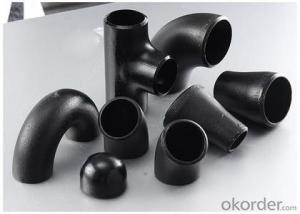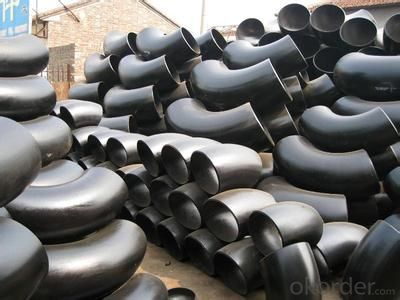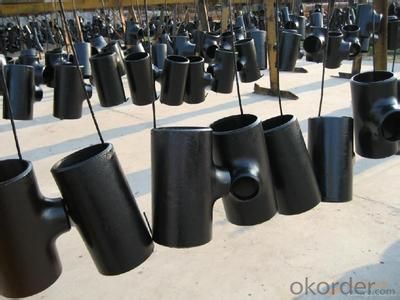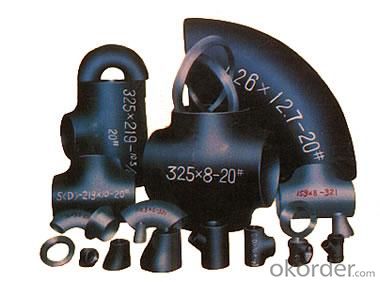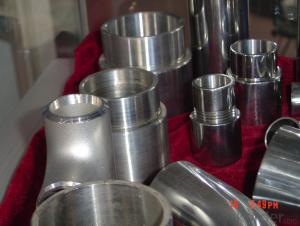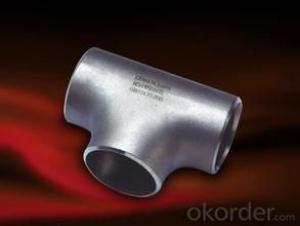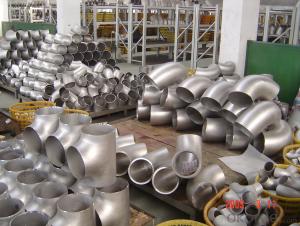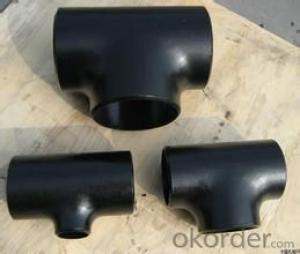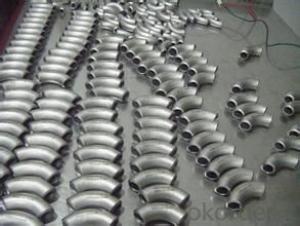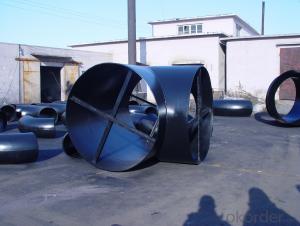STEEL PIPE BUTT WELDED FITTING A234 WPB ANSI B16.9 BEST PRICE
- Loading Port:
- Tianjin
- Payment Terms:
- TT or LC
- Min Order Qty:
- 1 pc
- Supply Capability:
- 10000 pc/month
OKorder Service Pledge
Quality Product, Order Online Tracking, Timely Delivery
OKorder Financial Service
Credit Rating, Credit Services, Credit Purchasing
You Might Also Like
Carbon Steel A234 WPB 90Deg LR Elbow, Tee, Reducer and Cap
Size : 1/2"-48"
Wall Thickness.: SCH10-SCH160, SGP , XS, XXS, DIN ,STD
| Name | ASTM A234 WPB carbon steel ELBOW , tee , reucer, and cap |
| Size | 1/2" - 48" |
| Angle | 45D 90 D 180D |
| Wall thickness | Sch5-Sch160 XXS,STD,XS, SGP |
| Standard | ASME B16.9, GOST 17375-2001, DIN2605 and JIS B2311, EN10253-1 etc. |
| We can also produce according to drawing and standards provided by customers. | |
| Material | Carbon steel pipe fittings , alloy steel and stainless steel. |
| Packaging | Wooden Cases, wooden pallet , or carton box , or nylog bag and then in wooden cases |
| Surface Treatment | Paintting black color , and Shot blasted,anti-rust oil , |
| Delivery Time | 20-30 days, after received advance payment. |
| Quality | First grade |
| Others | 1.Special design available according to your drawing. |
| 2.anti-corrosion and high-temperature resistant with black painting | |
| 3. All the production process are made under the ISO9001:2000 strictly. | |
| 4. A conformity rate of ex-factory inspection of products. | |
| 5. we have export right , offering FOB , CNF CIF price |
STANDARD & MATERIAL GRADE
STANDARD Of Carbon Steel Butt-Welded Fitting
| Standard | Wall Thickness | Type | |
| American Standard | ASME B16.9 | S5S ~ XXS | 45D, 90D, 180D ELBOW, TEE, REDUCER, CAP, STUB END |
| ASME B16.11 | |||
| ASME B16.28 | 90D SR ELBOW | ||
| Japanese Standard | JIS B2311 | SGP ~ LG |
MATERIAL Of Carbon Steel Butt-Welded Fitting
| Carbon Steel聽 | ||
| Material Standard | Material Grade | |
| ASTM | ASTM A234 | WPB |
- Q: Can steel pipes be used for chemical refineries?
- Yes, steel pipes can be used for chemical refineries. Steel pipes are commonly used in chemical industries due to their high strength, durability, and resistance to corrosion. They can withstand high pressure and temperature conditions, making them suitable for transporting various chemicals and fluids within a refinery. Additionally, steel pipes can be easily welded, ensuring a secure and leak-proof system in chemical refineries.
- Q: Are steel pipes suitable for potable water supply?
- Yes, steel pipes are suitable for potable water supply. They are durable, have a long lifespan, and can withstand high pressure. Additionally, steel pipes are resistant to corrosion and provide a reliable and safe option for transporting potable water.
- Q: What is the difference between the stainless steel pipe welded pipe and seamless pipe?
- Grain size: usually, the grain size of the metal is related to the heat treatment temperature and the time at which the metal is kept at the same temperature. Therefore, the welded pipe and seamless tube annealing of the same grain size. If the minimum tube cold treatment, the grain size of the weld metal is smaller than the grain size, welding or grain size is the same.Strength: the strength of the pipeline in the composition of the alloy and alloy containing the same and the same heat treatment of seamless tube and seamed tube essentially consistent strength. After the tensile test and three-dimensional vibration test, tube tearing almost all occurred in the welding point or away from the heated area where. This is because there is little impurity in the weld and the nitrogen content is slightly higher, so the strength of the welded joint is better than that of other parts. However, the ASME Boiler and Pressure Vessel Association believes that the seamed tube can withstand 85% of the allowable pressure, which is mainly due to improved welding equipment data collection prior to today. The provisions of ASME 100% completely under license by ultrasonic testing pressure tube. Similarly, Europe and Asia also stipulates that can ensure the quality of welding performance by eddy current test tube, the eddy current testing is subject to legal procedures and licensed institutions. Trent's eddy current test was approved by the Swedish power division. ASME believes the current loss is relatively small, high-quality performance based on the seamed tube.
- Q: Can steel pipes withstand high temperatures?
- Yes, steel pipes can withstand high temperatures. Steel is known for its excellent thermal conductivity and high melting point, making it suitable for various applications that involve exposure to elevated temperatures.
- Q: Can steel pipes be used for conveying slurries or abrasive materials?
- Yes, steel pipes can be used for conveying slurries or abrasive materials. Steel pipes are known for their durability and resistance to wear and tear, making them suitable for handling abrasive substances. Additionally, their smooth interior surface reduces friction, preventing clogging and ensuring efficient flow of slurries or abrasive materials.
- Q: What's the difference between steel pipe and pipe fittings?
- Pipe classification: steel pipe seamless steel pipe and welded steel pipe (tube) two categories. It can be divided into round tube and special-shaped tube according to the sectional shape. The round steel tube is widely used, but there are some special-shaped steel tubes such as square, rectangle, semicircle, hexagon, equilateral triangle and octagon.
- Q: What are the different methods of pipe support for steel pipes?
- Various methods exist for supporting steel pipes, each aimed at guaranteeing pipe stability, alignment, and protection. Some frequently employed techniques are as follows: 1. Pipe Hangers: These devices suspend or bear the weight of the pipe from above. Typically crafted from metal, they can be adjustable or fixed, allowing for easy installation and maintenance. Depending on the application, pipe hangers can take the form of clevis hangers, beam clamps, or pipe rollers. 2. Pipe Shoes: These supports attach directly to the underside of the pipe, providing a stable resting surface. Usually made from steel or other durable materials, pipe shoes prevent pipe movement, absorb vibrations, and distribute weight evenly. They find common use in applications involving high temperatures or requiring thermal expansion. 3. Pipe Clamps: These devices fasten pipes together or secure them to structures. Constructed primarily of metal, pipe clamps come in various sizes and designs to accommodate different pipe diameters and configurations. They provide support and prevent sagging or movement, particularly in areas with directional or elevation changes. 4. Pipe Racks: These structures are custom-designed to support multiple pipes in an organized and secure manner. Commonly found in industrial settings like refineries or power plants, pipe racks store or support large quantities of pipes. Typically made of steel, they can be tailored to suit different pipe sizes and layouts. 5. Pipe Guides: These devices facilitate pipe movement control, especially during thermal expansion or contraction. Fixed to the structure, pipe guides offer a sliding surface that accommodates longitudinal pipe movement. They are frequently utilized in applications involving temperature variations, such as steam or hot water systems. These represent just a few examples of the numerous methods available for supporting steel pipes. The choice of support method depends on factors such as pipe size, weight, temperature, and specific application requirements. Selecting the appropriate support method is crucial to ensure pipe longevity and integrity while preventing issues like sagging, misalignment, or failure.
- Q: Can steel pipes be used for underground drainage in acidic soils?
- Yes, steel pipes can be used for underground drainage in acidic soils. However, it is important to consider the type of steel used and the corrosion resistance properties to ensure longevity and prevent potential damage from the acidic environment. Additionally, protective coatings or linings can be applied to the steel pipes to enhance their resistance to corrosion in acidic soils.
- Q: What do you mean by "SC" in welded pipe SC200? What's the diameter of 200?
- SC in principle, it should be called water gas pipe, also called thick wall steel pipe;
- Q: What are the different types of steel pipes available in the market?
- There are several different types of steel pipes available in the market, including carbon steel pipes, stainless steel pipes, alloy steel pipes, and galvanized steel pipes. Each type of steel pipe has its own unique properties and uses, making them suitable for various applications in industries such as construction, oil and gas, plumbing, and automotive.
Send your message to us
STEEL PIPE BUTT WELDED FITTING A234 WPB ANSI B16.9 BEST PRICE
- Loading Port:
- Tianjin
- Payment Terms:
- TT or LC
- Min Order Qty:
- 1 pc
- Supply Capability:
- 10000 pc/month
OKorder Service Pledge
Quality Product, Order Online Tracking, Timely Delivery
OKorder Financial Service
Credit Rating, Credit Services, Credit Purchasing
Similar products
Hot products
Hot Searches
Related keywords
